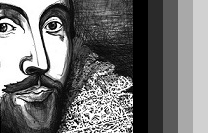Thursday,21,2019
Prof. Pralay Kumar Deb
Formerly Department of English, Kalyani University
(Interviewed by Dr. Paromita Chakravarti and Sri Abhishek Sarkar)
Year of passing B.A. and M.A. Details of the institutions concerned.
B.A., English (Honours) from Presidency College in 1960 and M.A. from the University of Calcutta through Presidency College in 1962. I joined North Bengal University as a lecturer in 1963.
When did your first encounter with Shakespeare take place (at school or college)?
I attended Surendranath Collegiate School, where we had one of Shakespeare’s sonnets, which was actually the song from As You Like It. In the Intermediate level, we had the forum scene from Julius Caesar.
College and university syllabi (Shakespeare plays and poems).
In the undergraduate level, we had As You Like It, Julius Caesar, Macbeth etc. for our M.A., we had Othello, Hamlet, Winter’s Tale, and Measure for Measure.
Who taught the texts in question?
Jyotirmoy Lahiri taught us in school. Then, Tarapada Mukherjee taught us Julius Caesar. Later, we studied under Tarak Nath Sen. Sailen [Sailendra Kumar] Sen taught us As You Like It. At the post-graduate level too, I was taught by a number of great teachers. Srichandra-babu [Srichandra Sen] taught us Othello. The batch after us was taught Antony and Cleopatra by Amalendu-babu [Amalendu Bose], but not us. We were the last batch to be taught by A.G. Stock.
What techniques were used (e.g., close reading, lecture demonstration, group discussion, seminars etc) for teaching Shakespeare?
Tarapada-babu would get very emotional while teaching, and spoke in a beautiful language when he taught. We listened to his lectures with rapt attention. There was no interaction, but he communicated the play to us in a beautiful, dramatic style. This was absent in Sailen Sen, who got so involved in the critical reading of the play that he began to ignore its dramatic aspect. Amalendu-babu had a flashy way of enacting the play, while Tarak-babu had a very serious, scholarly approach to it. I would also attend lectures in Bangabashi College, where I heard the great Shakespeare scholar Nirendranath Roy.
He and Sitangshu Maitra both took classes on Marxist criticism.
Were expletives and sexual references omitted?
No, never were they mentioned. There were boys and girls in the class and it would have been embarrassing for both the teachers and the students. Now we don’t omit these things, but then everyone skipped those parts.
How far was the socio-historical context of plays discussed?
There was no detailed discussion like there is today. We discussed only the bare minimum needed to understand a text.
Editions and critical material prescribed and used.
We used the Verity editions for the most part. Some critical material was prescribed to us. We were encouraged to read Bradley, for example. But in our days, we did not have access to too many texts.
Did the teacher refer to stage and film productions of Shakespeare?
No. Like I said, it was only about a close-reading of the play.
Whether the text was related to performance conventions.
Not really. Probodh-babu (P.C.Ghosh), who was very interested in theatre himself, would give us ideas about the stage conditions and what the audience was like. This was a part of the background lectures.
Whether there was any performance of Shakespeare at the institution.
There were performances, but not any Shakespeare production from what I can recall.
What about other contemporary productions?
I watched a lot of plays at the time, by Bibhas Chakraborty, Shambhu Mitra etc. I watched a Macbeth production too.
What about film adaptations?
I had watched a film version of A Midsummer’s Night Dream. Frankly, I had gone to see it with my students and I was a little uncomfortable in some parts. I have seen the film on Julius Caesar as well as Olivier’s Othello. I have seen both Polanski’s and Orson Welles’s Macbeth. I really liked both.
Account of classmates or students who later distinguished themselves as teachers, performers etc.
The famous poets Subodh Sarkar and Mallika Sengupta were both my students.
Noticeable changes in Shakespeare pedagogy and student reaction over the decades.
Earlier, Marxist analysis was the trend in addition to the conventional close-reading style of teaching. Now, that has changed. Shakespeare is taught so differently. Now, they use Cultural Materialism and New Historicism: that is the angle now. For example, we saw The Tempest as a philosophical comedy. Now, one cannot see it without the obvious colonial and postcolonial overtones. We have learned to read Shakespeare anew. But I must say that I have seen that the student reactions have been the same to Shakespeare. Some people have more emotional reactions, some less so. But everyone is moved by Shakespeare. However, I must say that over the years, I have seen a lack of seriousness in the students.
On teaching Shakespeare.
While teaching I myself tried to add a space for interaction in class in addition to the older lecture-based system.
Do you think the explosion of theory has caused a lack of interest in Shakespeare?
No. In fact, I think the opposite is true in a number of cases.
How would you react to the phenomenon of reading Shakespeare in a simplified language or in paraphrase, now popular among students in the West?
This is being done to make it simpler to understand the texts, but we have all faced the difficulty in understanding language like that. It is alright; sometimes young people just want to understand the text easily. However, I personally believe that there is no point in reading Shakespeare in modernized English.
